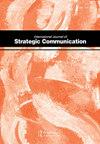员工角色和沟通责任在内部社交媒体构思过程中的作用
IF 1.9
Q1 COMMUNICATION
International Journal of Strategic Communication
Pub Date : 2023-02-17
DOI:10.1080/1553118X.2023.2166511
引用次数: 0
摘要
本文是对员工沟通角色与责任的新兴研究。本文探讨了员工如何以及为什么在内部社交媒体的构思过程中在不同角色之间转换时充当负责任的沟通者。实证材料包括对员工在内部社交媒体上的想法的在线观察和对丹麦一家知识密集型组织员工的14次访谈。本文利用身份工作和话语分析,分析了员工在内部社交媒体上产生想法时所扮演的不同角色,转变和定位。该分析确定了八种不同的沟通角色:外交家、专家、预测者、老手、推动者、调查员、怀疑论者和学徒。角色框架在微观层面上提供了关于员工角色多样性和特征的新知识,以及他们如何在推动构思过程中相互补充。这个框架可以为管理人员提供一个分析的视角,以确定在过程的不同阶段与角色设定相关的潜在挑战。认识到不同的角色及其对流程的重要性,也可能鼓励员工克服障碍,比如在不稳定、不确定、复杂和模棱两可的背景下,在网上提出想法时,不安全感和对同事批评反应的恐惧。本文章由计算机程序翻译,如有差异,请以英文原文为准。
How Employees’ Roles and Communication Responsibility Play a Role in an Ideation Process on Internal Social Media
ABSTRACT This article contributes to the emerging research on employees’ communication roles and responsibility. The article explores how and why employees act as responsible communicators while shifting between different roles in an ideation process on internal social media. The empirical material consists of online observations of employee ideation on internal social media and 14 interviews with employees in a Danish knowledge-intensive organization. Drawing on identity work and discourse analysis, this article analyzes the different roles that employees enact, shift and position themselves in when generating ideas on internal social media. The analysis identified eight different communication roles: Diplomat, Expert, Forecaster, Veteran, Facilitator, Investigator, Skeptic, and Apprentice. The role framework provides new knowledge on the diversity and characteristics of employees’ roles on a micro-level and how they complement each other in driving the ideation process forward. This framework may provide managers with an analytical lens to identify potential challenges related to role enactment at different stages of the process. Awareness of the different roles and their significance for the process may also encourage employees to overcome barriers such as insecurity and fear of critical reactions from their colleagues when they generate ideas online in a context of volatility, uncertainty, complexity and ambiguity.
求助全文
通过发布文献求助,成功后即可免费获取论文全文。
去求助
来源期刊

International Journal of Strategic Communication
Social Sciences-Sociology and Political Science
CiteScore
3.40
自引率
0.00%
发文量
39
期刊介绍:
The International Journal of Strategic Communication examines the philosophical, theoretical, and applied nature of strategic communication, which is “the purposeful use of communication by an organization to fulfill its mission.” IJSC provides a foundation for the study of strategic communication from diverse disciplines, including corporate and managerial communication, organizational communication, public relations, marketing communication, advertising, political and health communication, social marketing, international relations, public diplomacy, and other specialized communication areas. The IJSC is the singular forum for multidisciplinary inquiry of this nature.
 求助内容:
求助内容: 应助结果提醒方式:
应助结果提醒方式:


